Ukraine war: Southeast Asian responses and why the conflict matters to the region
Southeast Asia's initial responses to Russia's invasion of Ukraine varied considerably, with Singapore taking the strongest stance and Myanmar supporting the Kremlin's actions. As the conflict intensified, regional responses strengthened somewhat: eight ASEAN members voted for a United Nations General Assembly resolution condemning Moscow's invasion; Vietnam and Laos, Russia's two closest partners in the region, abstained. The Russia-Ukraine war is likely to have varying degrees of economic, political and security impacts on the region. A key concern is if China takes a leaf from Russia's playbook in terms of using manufactured histories and grey zone/hybrid warfare tactics, and disregarding international law.
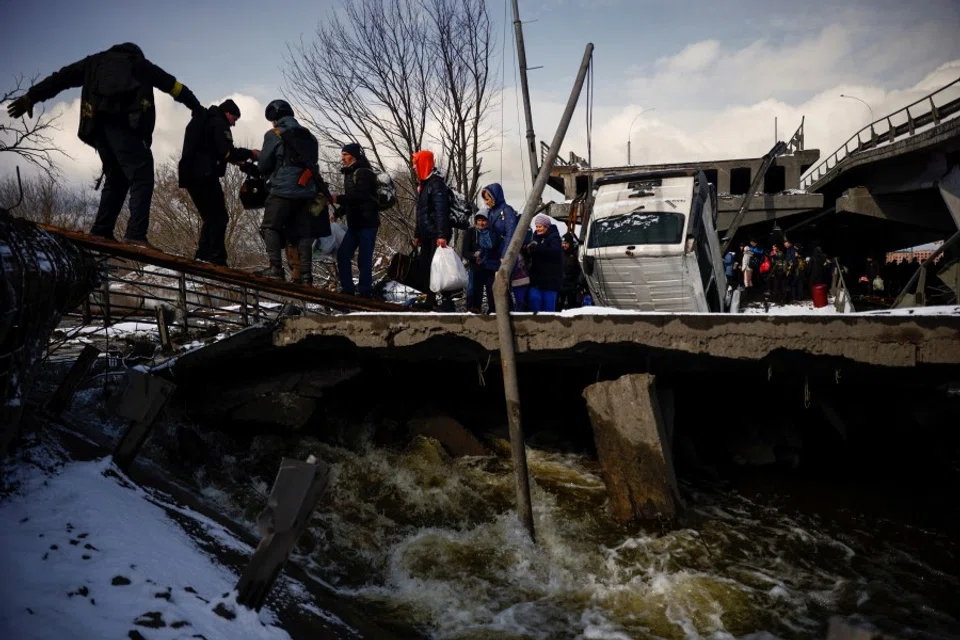
On 24 February 2022, Russia invaded Ukraine. The responses from the ten ASEAN member states varied considerably, ranging from Singapore's condemnation and imposition of sanctions on Russia to the Myanmar military regime's endorsement of the Kremlin's actions. Due to the member states' differing positions, ASEAN issued a lowest common denominator response on 26 February that was widely criticised for being bland and insipid. A few days later, however, in a vote at the United Nations General Assembly (UNGA), eight ASEAN member states voted in favour of a resolution condemning Russia's invasion, while Vietnam and Laos abstained.
The global crisis triggered by the Russia-Ukraine war will likely cause serious economic problems for Southeast Asia. The rising price of energy, food and commodities, worsening supply chain disruptions and stock market volatility could threaten the region's economic recovery from the Covid-19 pandemic.
ASEAN as a grouping of smaller states will have to grapple with the precedent that the invasion sets: the blatant violation of a fundamental principle in international law, namely the respect for an independent state's sovereignty as enshrined in the United Nations Charter. More importantly, there is a growing convergence in geopolitical views between Russia and China, the emerging superpower in Asia. While it is unlikely that China will completely replicate Russia's approach in Ukraine, there are parallels: the use of manufactured history to support territorial claims; the use of grey zone tactics and hybrid warfare; and a disregard for international law.
Southeast Asian positions
Singapore
In Southeast Asia, Singapore's response to Russia's attack on Ukraine was by far the strongest. It was the only ASEAN member to condemn Russia by name and announce a range of financial sanctions and export control measures on Moscow. As with Vietnam's invasion of Cambodia in 1978, Iraq's occupation of Kuwait in 1990 and Russia's annexation of Crimea in 2014, Singapore took a principled stand: that Russia's "unprovoked" military invasion violated international law and the UN Charter which prohibits acts of aggression against sovereign states. Prime Minister Lee Hsien Loong warned that if international relations were based on "might is right", the "world would be a dangerous place for small countries like Singapore".
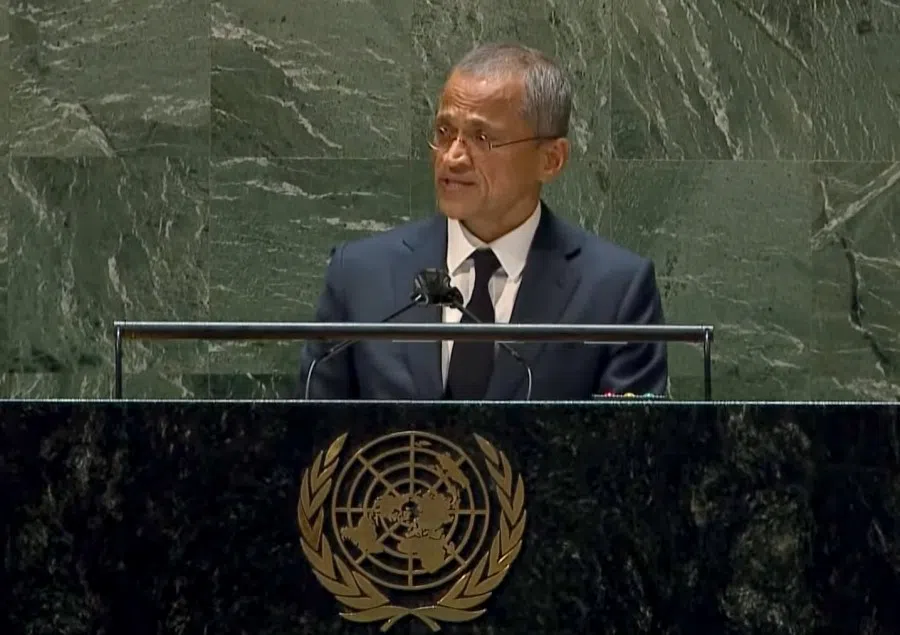
Indonesia, Brunei and the Philippines
Indonesia, Brunei and the Philippines condemned Moscow's attack on Ukraine, but did not name Russia as the aggressor.
Prior to the invasion, Indonesia had called for Russia to resolve its dispute with Ukraine peacefully, warning that a conflict risked derailing the world's economic recovery from the pandemic. On the day of the attack, President Joko Widodo called for an end to hostilities while the foreign ministry "condemned any action that violates territory and sovereignty".
Two days later, Brunei responded in a similar vein, condemning "any violation of sovereignty, independence and territorial integrity of any country".
The Philippines was initially focused on evacuating its nationals from Ukraine. Philippine President Rodrigo Duterte, who on taking office in 2016 pledged to pursue a more balanced foreign policy by improving relations with Russia and China, has remained silent on the conflict. His defence secretary, Delfin Lorenzana, stated the Philippines would remain "neutral" because the conflict was "none of our business". His approach stands in marked contrast to Philippine efforts to internationalise the South China Sea dispute. However, a few days after the Russian assault, the Philippines expressed "explicit condemnation of the invasion of Ukraine".
As with Vietnam, Laos sought to protect its long-standing friendship with Russia by avoiding criticism of Moscow.
Malaysia, Thailand, Vietnam, Laos and Cambodia
The responses from these five ASEAN members were relatively muted.
Malaysian Prime Minister Ismail Sabri Yaakob said he was "saddened" by events in Ukraine. His office later issued a statement of "serious concern", but instead of singling Russia out as the aggressor, urged "all concerned parties" to de-escalate the conflict.
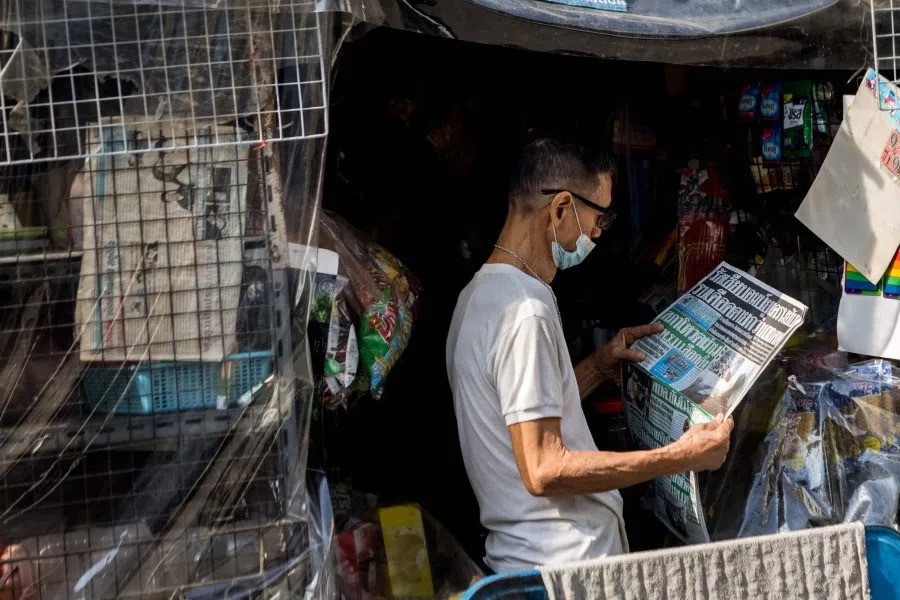
As with Malaysia, Thailand expressed "deep concern" and its support for a peaceful resolution of the conflict through dialogue. Thailand generally has cordial relations with Russia, and tries to avoid taking sides in great power politics. Unsurprisingly, therefore, Prime Minister Prayut Chan-o-cha said that Thailand would remain "neutral" in the conflict.
Vietnam has abstained from any criticism of President Putin's actions because Russia is its most important defence partner. Over the past two decades, Vietnam has relied on Russian-manufactured weapons to modernise its armed forces to serve as a deterrent against China in the South China Sea. Keen not to offend Moscow, Vietnam stated that it was "deeply concerned" by the conflict and that the "relevant parties" should "exercise restraint", respect international law and seek a peaceful resolution through dialogue.
Cambodian Prime Minister Hun Sen's response has been the weakest among these countries, expressing only his hope for a "peaceful solution" to the conflict.
As with Vietnam, Laos sought to protect its long-standing friendship with Russia by avoiding criticism of Moscow. At the outbreak of hostilities, the Lao foreign ministry did not even express concern, only that it was closely following the "evolving, complex and sensitive" situation in Ukraine and that "all parties concerned" should "exercise utmost restraint", de-escalate tensions and pursue a peaceful settlement through diplomatic measures.
Cambodian Prime Minister Hun Sen's response has been the weakest among these countries, expressing only his hope for a "peaceful solution" to the conflict. As with neighbouring Thailand, Hun Sen said Cambodia would remain "neutral" in the dispute.
Myanmar
Myanmar is the only country in Southeast Asia to support Russia's actions. Following the military coup in February 2021, Russia was the first major power to recognise the junta as the legitimate government of Myanmar. Keen to return the diplomatic favour, a spokesman for the military said Russia was acting to protect its own sovereignty and demonstrating its great power status.
Both Moscow and the coup leaders are keen to strengthen relations, especially through more acquisitions of Russian arms, though the junta has admitted that financial sanctions imposed on Russia could complicate the procurement process. In contrast to the junta's support for the Kremlin, Myanmar's government in exile, the National Unity Government, condemned the invasion.
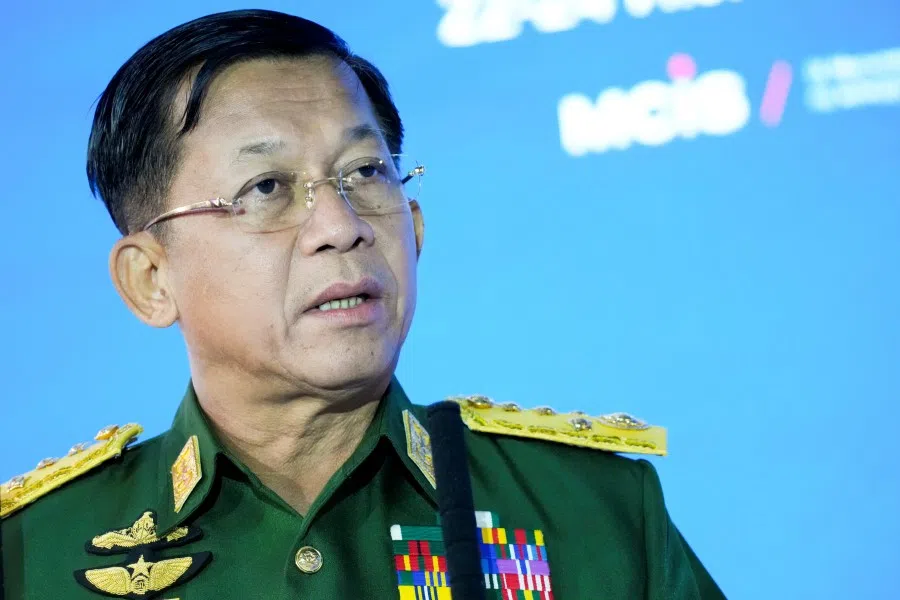
ASEAN
Cambodia is the chair of ASEAN in 2022, and on the day Russia launched its attack, Prime Minister Hun Sen said that the organisation needed a "strong voice" in international affairs. Given the varying positions among its members, however, it was unsurprising that on 26 February, it issued a weak, bottom-line consensus statement. The ten foreign ministers stated they were "deeply concerned" and called on the "relevant parties" to "exercise maximum restraint", pursue dialogue and de-escalate tensions.
Although the statement invoked the 1976 ASEAN Treaty of Amity and Cooperation, which Russia acceded to in 2004, it did not condemn Moscow for violating its central principles: "mutual respect for the independence, sovereignty, equality, territorial integrity and national identity of all nations"; "non-interference in the internal affairs of another country"; "settlement of differences and disputes by peaceful means"; and the "renunciation of the threat or use of force". Widely criticised for its mild tone, the statement received little attention outside the region, and served only to highlight existing divisions within ASEAN rather than make a meaningful contribution to the international community's efforts to bring pressure to bear on President Putin to cease military operations in Ukraine.
On 2 March, eight ASEAN members - Brunei, Cambodia, Indonesia, Malaysia, Myanmar, the Philippines, Singapore and Thailand― joined 141 other countries in voting for a non-binding resolution which "deplored" Russia's "aggression" against Ukraine...
Southeast Asian countries at the UN
Following the invasion, Singapore joined with 81 other countries in co-sponsoring a United Nations Security Council (UNSC) resolution condemning Russia's invasion. Due to Russia's veto on the UNSC, the resolution was defeated. However, a new resolution was drawn up by the UNGA - with Singapore and Cambodia among the co-sponsors - and by then, with the conflict worsening, a majority of ASEAN member states were ready to take a harder line against Russia, including Vietnam.
On 2 March, eight ASEAN members - Brunei, Cambodia, Indonesia, Malaysia, Myanmar, the Philippines, Singapore and Thailand― joined 141 other countries in voting for a non-binding resolution which "deplored" Russia's "aggression" against Ukraine and called on Moscow to immediately withdraw its forces from the country. Myanmar's ambassador to the UN, U Kyaw Moe Tun, who was dismissed by the junta after he condemned last year's coup, is still Myanmar's legitimate representative at the world body and voted for the UNGA resolution. 35 countries abstained, including Vietnam and Laos.
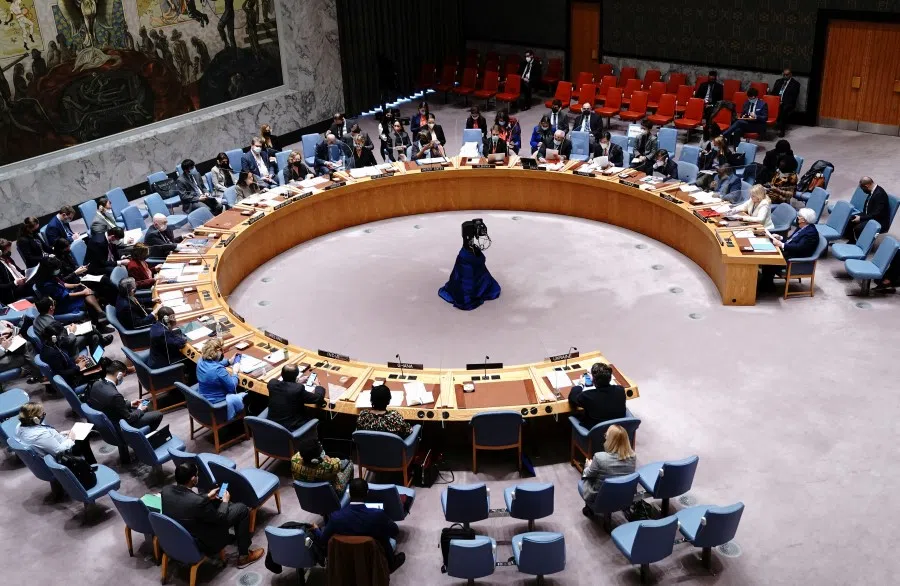
Potential economic, political and security impacts
The Russia-Ukraine war is already having profound global consequences that are affecting every part of the world. Southeast Asia will not be spared, though the severity of the impact will depend on the duration of the conflict and its ultimate outcome.
...the conflict could derail a global recovery from the Covid-19 pandemic, including that of Southeast Asian economies.
Economic impact
As the economic ties between Russia and Southeast Asia are modest, the region stands to lose very little if the Russian economy buckles under the weight of international sanctions. In 2020, Russia was ASEAN's 11th largest trade partner with two-way trade at only US$13.6 billion. In the same year, Russia invested a mere US$63.2 million in the region. However, the global economic fallout from the war will likely have a significant effect on regional states.
The conflict has led to a spike in oil and gas prices which could rise further if Russia decides to cut energy exports or if the major industrial economies cut Russian imports. Ukraine and Russia are major agricultural producers, especially wheat and corn, and supply disruptions will lead to increased food prices. Higher energy and food prices will fuel inflation. The price of commodities produced in Russia that are crucial to the electronics industry such as nickel, titanium, copper and platinum, will also rise.
The war has disrupted air, rail and sea transportation links, worsening global supply chain problems caused by the pandemic. In short, the conflict could derail a global recovery from the Covid-19 pandemic, including that of Southeast Asian economies.
Political impact
Russia has been an ASEAN dialogue partner since 1996. It participates in all the ASEAN-led forums, including the ASEAN Regional Forum (ARF), the ASEAN Defence Ministers' Meeting Plus (ADMM-Plus) and the East Asia Summit (EAS). In 2018, ASEAN-Russia relations were elevated to a strategic partnership. However, President Putin has only attended the EAS in person once (in 2018) and twice virtually (in 2020 and 2021), preferring to send his foreign minister or prime minister instead while he attends the APEC Summit.
The Russia-Ukraine war is unlikely to seriously impact Moscow's dialogue partnership with ASEAN. As noted above, ASEAN's response to the invasion has been mild. However, the conflict could forestall Vietnam's proposal for a free trade agreement between ASEAN and the Russian-led Eurasian Economic Union (which already has FTAs with Vietnam and Singapore). Also, if the ASEAN-led summits take place in person in Phnom Penh in November, and the conflict is still ongoing, President Putin's attendance at the ASEAN-Russia Summit and EAS, as well as the APEC Summit in Bangkok, will be highly unlikely.
Security impact
Russia's primary security activity in Southeast Asia is arms sales. Since Putin took office in 2000, Russia has become the leading arms supplier to the region, with sales amounting to US$10.7 billion. Western economic sanctions imposed on Russia could impair Russian defence sales to the region. Export controls imposed by the US and other countries on items that can be used in military equipment manufactured in Russia could affect the supply of weapons systems and spare parts to Southeast Asian countries that have already purchased Russian arms.
Washington may issue a waiver on CAATSA sanctions against Vietnam given the growing strategic ties between the two countries in the face of China's assertive activities in the South China Sea.
Washington may also double down on its enforcement of the 2017 Countering America's Adversaries Through Sanctions Act (CAATSA) which imposes sanctions on countries that have commercial dealings with Russia's military industrial complex. So far, Washington has only CAATSA sanctions against China and Turkey, but it could signal that it is ready to impose them on Southeast Asian countries planning to purchase new military equipment from Russia. This would make regional states think twice about signing contracts with Russian defence companies (even before the conflict, the threat of CAATSA sanctions led Indonesia to cancel an order for Russian SU-35 fighter jets while the Philippines dropped the idea of buying Russian submarines). However, Washington may issue a waiver on CAATSA sanctions against Vietnam given the growing strategic ties between the two countries in the face of China's assertive activities in the South China Sea.
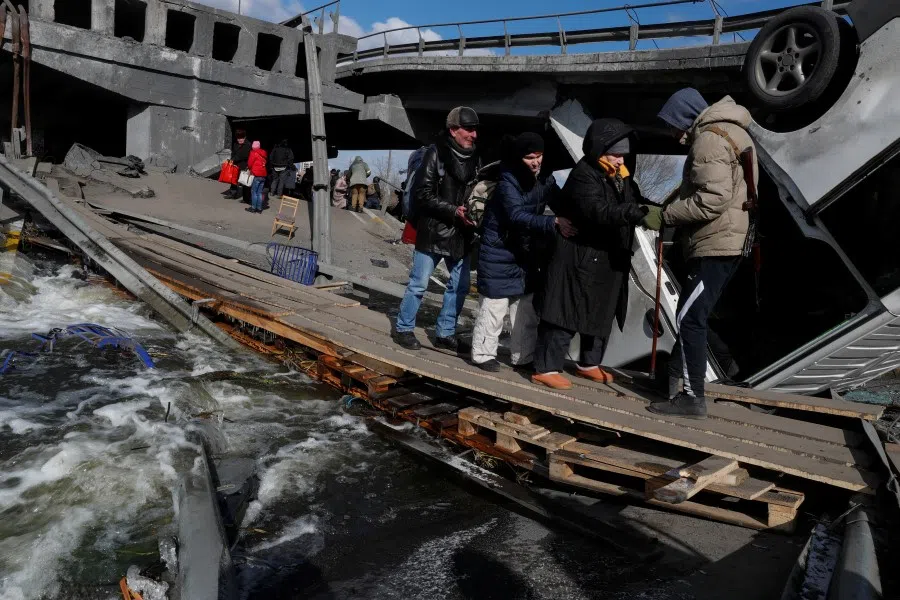
It is too early to say how the conflict will affect the US's global military posture. Although both the Trump and Biden administrations labelled the Indo-Pacific as America's priority strategic theatre, the Russia-Ukraine war, and heightened tensions between NATO and Russia, mean that for the short term at least, Europe will take up much of Washington's strategic bandwidth. This will reinforce long-standing concerns in Asia that despite America's intention to "re-pivot" to the region, it will periodically be distracted by events in Europe or the Middle East.
While there is as yet no indication that the war will require the Pentagon to redeploy military assets from the Indo-Pacific to the Euro-Atlantic region, or that US diplomats and senior officials will devote less attention to the Indo-Pacific, some Southeast Asian countries will require reassurances of America's commitment to regional security which was undermined to some degree during the Trump administration. President Biden will be expected to give those reassurances at a US-ASEAN summit scheduled for late March.
Precedence and implications
While there are reasons behind ASEAN's relatively mild response to the invasion, the grouping has to be mindful of two major implications of Russia's actions in Ukraine.
The need to defend international law principles, as well as castigate deemed offenders of those principles, is paramount to Southeast Asia where the interests of great powers, and their differing visions of regional order, increasingly collide....
First, the failure to upbraid Russia for its flouting of international law would set a bad precedent if and when similar incidents were to occur in Southeast Asia and the broader Indo-Pacific. The need to defend international law principles, as well as castigate deemed offenders of those principles, is paramount to Southeast Asia where the interests of great powers, and their differing visions of regional order, increasingly collide. Any attempts to undermine the rules-based international order will cut to the core of Southeast Asia's security and prosperity.
Second, the Russian invasion has a particular bearing on Southeast Asia, given converging Sino-Russian views on pushing back against a US-led regional order, and the possibility that Beijing might take a page out of Russia's Ukrainian playbook: the use of manufactured pretexts for an invasion or forcible acquisition of disputed territories; the greater use of grey zone tactics and hybrid warfare; and the flouting of norms of international law.
A parsing of China's approach to the Ukrainian crisis offers some clues how the Ukrainian crisis could impact Asia, in particular the three 'hot spots': the South China Sea, the Senkaku/ Diaoyu Islands and the Taiwan Straits.
First, China has a quasi-alliance with Russia. There is now a growing strategic partnership and the two sides recently professed that there are "no limits" or "forbidden areas" of cooperation. Both share the view that the US is in decline - a state of affairs that is a vindication of autocracy.
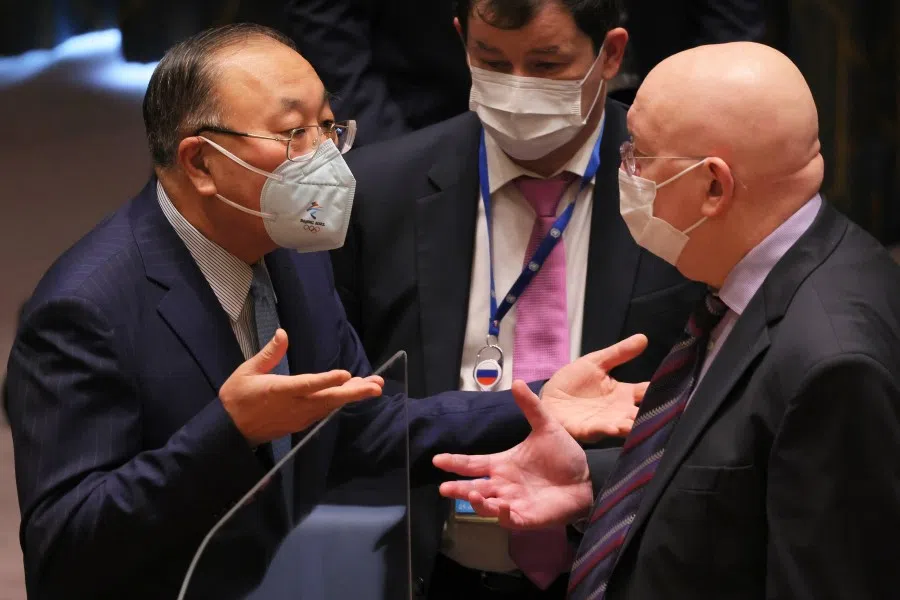
Second, China is sitting on the fence about the Russian invasion - a unique state of affairs when many countries have condemned the invasion. In the run-up to the invasion, there was some coordination between China and Russia. In a joint statement issued during Putin's visit to Beijing in early February, China backed Russia's opposition to further NATO expansion - a key rationale for the invasion of Ukraine. Russia launched the invasion after the end of the Beijing Winter Olympics.
China employed four strategies in the run-up: stressing respect for the sovereignty and independence of all countries; calling for dialogue and consultation; recognising Russia's "legitimate" security concerns; and accusing Washington of "stirring up trouble" and disseminating propaganda. The latter two approaches became more evident in early February. On 25 February, China abstained from a draft UNSC resolution condemning the invasion.
...the Russian invasion will provide some instructive lessons for China, if it decides to forcibly acquire disputed territories in Asia. The toolbox of options that China has holds three main components: the use of controversial pretexts; the use of grey zone/hybrid tactics; and actions which challenge the norms of international law.
Three, China would be carefully observing Russia's use of grey zone tactics (limited military competition which simmers under the threshold of war) and hybrid warfare (grey zone tactics mixed with combat operations). Russia has been using grey zone tactics in Ukraine since 2014, when "little green men" moved in to occupy Crimea. In late 2021, it moved 100,000 troops to its border with Ukraine, causing the Ukrainian currency and sovereign bond yields to fall sharply.
China, too, has employed "innovative and imaginative" grey zone tactics in areas such as the South China Sea and East China Sea. For example, in the latter, China sent a "timed sequence" of vessels into disputed territory: first fishery patrol ships, then coast guard cutters and finally People's Liberation Army (PLA) Navy warships.
China is unlikely to fully reproduce Russia's approach to Ukraine - that is, scaling up from grey zone/ hybrid warfare to full-scale conflict. However, the Russian invasion will provide some instructive lessons for China, if it decides to forcibly acquire disputed territories in Asia. The toolbox of options that China has holds three main components: the use of controversial pretexts; the use of grey zone/hybrid tactics; and actions which challenge the norms of international law.
In the South China Sea, China could, after the execution of grey zone/ hybrid warfare tactics, use force to take control of atolls in the Spratly Islands occupied by the Philippines, Vietnam and Malaysia, claiming that they are China's historic territories. China has consistently employed the "historical" approach which has no legal basis under the United Nations Convention on the Law of the Sea (UNCLOS) as reaffirmed by a 2016 arbitral tribunal on the South China Sea.
If China were to borrow from Russia's playbook, it might consider the use of pretexts which are controversial - that is, the need to conduct "defensive operations" to secure the Spratlys, in lieu of "US aggression". This would be consistent with past Chinese behaviour. China has argued - quite controversially - that US freedom of navigation operations and "militarisation" (military deployments) in the disputed maritime area are dangerous and undermine stability.
China has maintained that its land reclamation in the South China Sea is mainly for civilian purposes (in addition to "necessary military defence requirements"), and will help meet Beijing's responsibilities and obligations such as maritime search and rescue, disaster prevention and weather observation.
The scenarios presented are plausible, but there is reason to believe that there would be some circumspection on China's part. Firstly, China will rue the consequences of any use of force to change the status quo...
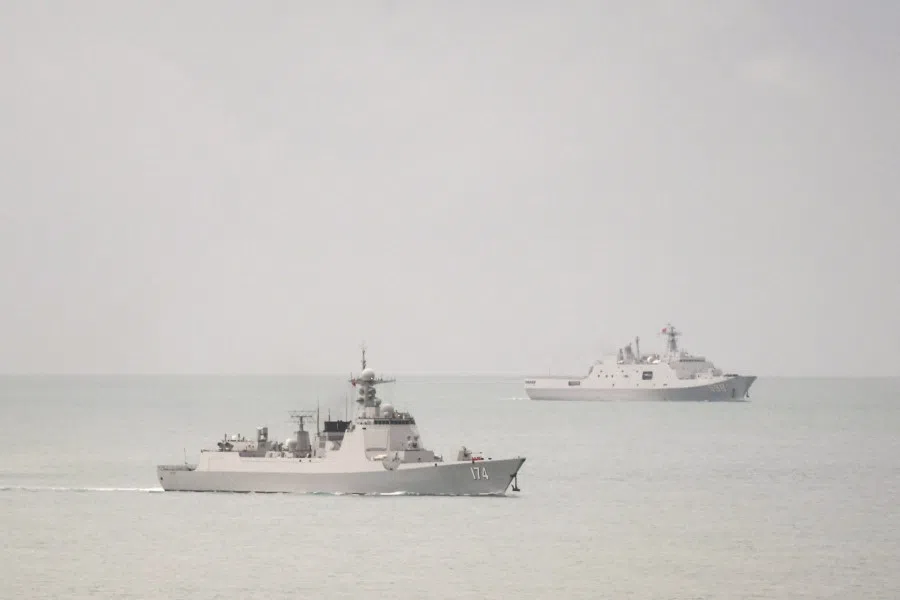
China could employ the same blend of tactics towards the disputed Senkaku/Diaoyu Islands in the East China Sea, which are occupied by Japan but disputed by China. In recent years, China has sent fishing boats, China Coast Guard vessels and PLA warships into the contiguous zone and territorial waters of the islands, triggering protests from Tokyo.
In the wake of Russia's invasion of Ukraine, there have been concerns in Taiwan that China could mount a similar operation to retake what it deems to be a rogue province. China has stressed that Taiwan is "not Ukraine" (a separate country from Russia) but an "inalienable part of China". But if China does decide to retake the island, it could follow after a series of grey zone tactics which China has already conducted regularly against the island.
The scenarios presented are plausible, but there is reason to believe that there would be some circumspection on China's part. Firstly, China will rue the consequences of any use of force to change the status quo: Russia's invasion has provoked condemnation from many countries and a raft of sanctions that will affect the Russian economy for years to come. Russia has not been averse to using military force as an instrument of foreign policy, i.e. Georgia in 2008, Syria since 2015 and Ukraine since 2014, but China has not been involved in an outright conflict since its border war with Vietnam in 1979.
China's economy is far larger than Russia's and more integrated into global supply chains and the world economy. As a Singaporean minister has noted, China and the US are "vital components" of a single system and "compete within the system". If China were to carry out the actions sketched out above, the reputational damage to its already-low trust ratings among Southeast Asians would be severe.
Compared to Ukraine, which is not a NATO member and not deemed a vital interest for Washington, the stakes for the US in Asia are far higher, given America's alliance commitments to Japan in the Senkakus and to the Philippines in the South China Sea. This would provide a deterrent to any Chinese attempts to change the status quo. While Washington does not have a formal military alliance with Taiwan, it is seen as the island's de facto security guarantor. The higher stakes for Washington should give China some grounds for circumspection.
This article was first published by ISEAS - Yusof Ishak Institute as ISEAS Perspective 2022/24 "Russia's Invasion of Ukraine: Southeast Asian Responses and Why the Conflict Matters to the Region".
Related: Did China miscalculate the Ukraine war? | Will China be emboldened by Russia's invasion of Ukraine? | Does Beijing benefit from US-Russia confrontation over Ukraine? | Why ASEAN must stand firm against Russia's invasion of Ukraine | Russian invasion of Ukraine poses geopolitical quandaries for Vietnam | On the wrong side of geography: Why is India tolerating Putin's Ukraine gambit?






